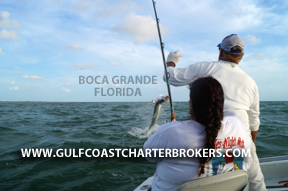The FWC is involved in a study (in partnership with Mote Marine Laboratories) to document the mighty Silver King. One of the "side Benefits" of this study is that they are DNA swabbing the tarpon that are weighed during the PTTS tournaments held in Boca Grande Pass. As we are firmly against the PTTS' practices and method of fishing utilizing jigs – this study could help us immensely in proving that the dead tarpon we see on our beaches following the tournaments are, in fact, a result of the PTTS tournaments and handling of tarpon.
However, the only way to PROVE these tarpon are affected by the PTTS is to DNA Swab the dead tarpon and have that sample analyzed through the FWC/Mote.
Many people have asked me questions about the study, but as I am not directly employed by either agency, I figured it best to "ask the experts!" Below is the response I received from the FWC regarding the study. Please feel free to pass this information along to others that have questions about the DNA Swabbing. Also – if you need a DNA kit, please contact me at 941-405-FISH, or Lew Hastings at the Boca Grande Chamber of Commerce – we both have kits available for you to carry on your boat/vehicle to be prepared if/when you see a dead tarpon.
Here's the FWC Response:
From: Guindon, Kathryn
Sent: Friday, June 08, 2012 9:57 AM
Subject: Tarpon Swab Kits – question reply
I am happy to answer your specific questions here.
1. How long is the DNA viable from a dead tarpon – i.e. can you still get a reading from a dead tarpon 1 day old, 3 days old, 6 days old?
Answer to Question 1)
As long as the tissue is not too decayed a DNA sample can be obtained from a dead tarpon. A few days old is not a problem. If the angler has a DNA sampling kit with him or her, scrape until you see silver (skin cells) on the sponge.
If the angler does not have a DNA sampling kit when encountering a dead tarpon, a scale can be removed from or a piece of the fin clipped from the carcass and placed in the freezer until a sample vial can be made available to the person collecting the tissue for DNA analysis.
Be sure to write that the tarpon was "found dead" on the data slip. We use the samples from live fish as a way to estimate statewide recapture rates, and samples from dead fish are omitted from that specific calculation. However, the DNA samples from dead tarpon are still useful for other purposes, such as to see if that fish was caught and sampled before, and it also serves as genetic sample from the species for population analyses. When we have a recapture we are also able to gain information on seasonal movement and habitat usage patterns.
2. If the DNA swab doesn't have to be refrigerated, how long is it viable? If it sits in a hot boat/truck, will it still work?
Answer to Question 2)
The liquid provided in the vials inside a tarpon DNA sampling kit is an ethanol solution and serves as a preservative for the skin cells on the sponge. As long as there is liquid in the vial and the sponge is moist, the sample is viable indefinitely. There is no refrigeration needed for these samples. These DNA samples can stay in a truck, home, garage, or drop shop location until they returned.
For unused vials left in boats, trucks, tackle boxes, garages…as long as there is liquid in the vial at the time of use the kit has no expiration date. The thing to watch out for is that with the heating and cooling of the plastic vials the ethanol will sometimes evaporate, especially if the lids are not tight. If there is no liquid in the vial do NOT place a sample in it.
3. Who is analyzing the data/recording the data?
Answer to Question 3)
Data is recorded by the angler taking the sample. Each kit has a data slip in it and a pencil for the angler to record the data. Once the samples are returned, to either to Mote or the FWC, the data are entered and proofed by them. The DNA samples are processed and analyzed at the Molecular Genetic Laboratory at FWRI by Dr. Mike Tringali. His lab uses genetic tools to assess or monitor 10 marine sport fishes and 4 freshwater fish species in Florida.
4. Where are the records published? Who can access those records? Can we request a copy at the end of season/end of the study?
Answer to Question 4)
Published records: I have attached the reprint from the paper published in 2007 on isolating the tarpon microsatellites used for our study.
We provide general annual updates to participants in the study with a newsletter. These newsletters are archived and available to anyone online at http://myfwc.com/research/saltwater/tarpon/genetics/newsletter/.
Anglers who sample a tarpon that gets caught and sampled again are notified and provided the specific information about that individual fish. It is not our intent to create and provide GPS point specific maps for the website or internet.
Genetic databases are accessible by approved project staff on secured networks. However, this is an FWC state research study funded by the Federal Aid in Sport Fish Restoration Grant and therefore the information is public record and can be requested.
Yes, I have heard there is confusion about the FWC and its role in the PTTS. FWC-FWRI staff (and Mote staff and volunteers) attend the PTTS events in the capacity to distribute DNA sampling kits to tarpon anglers and to collect DNA samples from tournament fish. The tarpon genetic recapture study was incorporated in some capacity into 22 different tarpon tournaments throughout Florida in 2011. We are involved in many of those same events and some new tournaments in 2012, including the World's Richest Tarpon Tournament put on by the Boca Grande Area Chamber of Commerce. In 2010, I did have a team of biologists from FWC-FWRI at the PTTS as part of a tarpon physiology research study. We are at each of these events as research biologists and have no "role" at the PTTS.
As for FB and other social media outlets: The FWC does have its own Facebook, Twitter, etc. accounts, and questions can be posted to us there where they will be referred to the proper office to handle the inquiry.
We want willing anglers to participate in this study on their own accord and anyone can find out more about this research study here: http://myfwc.com/research/saltwater/tarpon/genetics/recapture-study/. This is a general article with links to most other information on our website about the Tarpon genetic recapture study. This research is providing a great opportunity for the anglers themselves to participate in learning more about tarpon.
As you have questions for me, I will try to answer them or pass them along to the best-suited person within the agency. For example, if a question pertains to law enforcement or management I would have to pass that along to other people.
Kathy

 Right from the beginning of the tournament,
Right from the beginning of the tournament, 